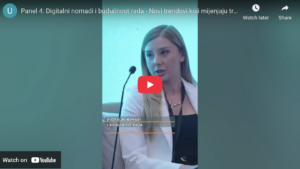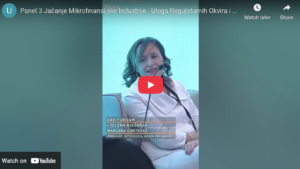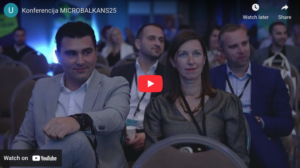
MICROBALKANS25: Reel Panel 5
Panel 5: Regulatory Innovation — How Policies Shape Technological Advancement At the MicroBalkans25 conference, Panel 5 brought together institutional representatives, technology leaders, and experts to
This series of national factsheets provides a snapshot of the various legislative frameworks concerning the provision of microcredit in Europe by non-bank financial intermediaries.
The national factsheets cover the following thematic areas:
1 Regulation of lending activity
2 Supervisory framework for non-bank lending
3 Products
4 Incentives and support
5 Development of existing framework for non-bank microcredit provision
6 Inclusive entrepreneurship and microenterprise development.
Regulation of Lending Activity
Since 2006, Bosnia and Herzegovina has held a specific regulatory framework for microcredit provision called “Law on Microcredit Organisations,” which is implemented by the two constitutional and legal entities of the country: Republic Srpska and Federation of Bosnia and Herzegovina. Non-bank MFIs are allowed to lend money directly under the legal status of microcredit foundations and microcredit companies (shareholding companies or joint stock companies). In terms of minimum capital, a microcredit company must have founding capital of EUR 255.646. A microcredit foundation must have paid-in capital of EUR 25.565. Since 2015, foundations have also started paying taxes on profits. Although the legislation in Bosnia and Herzegovina specifically defines microloans,1 it does not distinguish between business and personal microloans.
Supervisory Framework for Non-Bank Lending
The lending activities of non-bank MFIs in both territories are supervised by the two separate banking agencies: Republic Srpska and Federation of Bosnia and Herzegovina. According to the Federation of Bosnia and Herzegovina, regulation of consumer protection is strict according to performance indicators: ROA must be positive, operational efficiency must be below 45%, PAR30 should not exceed 5%, write-offs must be under 3% of the total portfolio and restructured loans below 5% of the total portfolio. There is also regular on-site supervision and microfinance organisations must send periodic reports to the two banking agencies. The regulation also includes transparency on pricing, credit file organisation and the income documentation of clients. Credit operations and clients’ access to finance are also affected by the legislation on preventing anti-money laundering and terrorism. Both foundations and companies are obliged to share client data with credit bureaus and both have access to the national credit bureau data.
Products
Although there is no a distinction between business and personal microloans by law, organisations disburse both products in practice. A foundation can provide microcredits up to EUR 5.106 and a microcredit company can lend up to EUR 25.532. There is no regulation on interest charged for either type of loan.
Incentives and Support
In Bosnia and Herzegovina, there are national/regional level funds dedicated to the provision of microcredit in the form of funds for on-lending (senior loans) and technical assistance from the European Fund for Southeast Europe (EFSE). However, the current context has no incentive support in the form of tax deductions for organisations that provide financial support to microcredit providers in the country.
Development of the Existing Framework for Non-Bank Microcredit Provision
Currently, microcredit organisations are formalising a network ¨AMFI¨ to work more closely with the Banking Agencies’ representatives to prepare amendments to the existing law. The Ministry of Finance of the Federation of Bosnia and Herzegovina has requested that this proposal be presented by the Banking Agency. Regular meetings and discussions are being held in the hopes of a positive change, although legal changes in the country usually take a long time to materialise. A challenge faced by NBFIs is to improve the regulatory framework in order to expand the type of financial services offered beyond lending, to include products such as savings, money transfers, insurance, etc.
Inclusive Entrepreneurship and Microenterprise Development
In the context of Bosnia and Herzegovina, no simplified administrative procedures are in place for entrepreneurs, and the government is not running any educational campaign to enhance inclusive entrepreneurship, microenterprise development, or entrepreneurial education as part of school curricula. In terms of public support, there is no welfare bridge to support unemployed people in the transition towards self-employment. Moreover, no business development services are available to micro- entrepreneurs. However, there are some initiatives from donors such as USAID, the Swiss Embassy and the Swedish Embassy/SIDA to support inclusive entrepreneurship and microenterprise development, which are dependent on donor led activity.

Panel 5: Regulatory Innovation — How Policies Shape Technological Advancement At the MicroBalkans25 conference, Panel 5 brought together institutional representatives, technology leaders, and experts to

Panel 4: Digital Nomads and the Future of Work — New Trends Changing the Market At the MicroBalkans25 conference, Panel 4 brought together experts who

Panel 3: Strengthening the Microfinance Industry — The Role of Regulatory Frameworks and Strategies for Long-Term Growth As part of the MicroBalkans25 conference, Panel 3

Check out the atmosphere of the MicroBalkans25 conference and unforgettable moments from the beautiful city that is hosting the Microfinance Leaders Region this year! With

We want to thank all of our coorganizers, supporters and participants that made this years’s MicroBalkans25 Conference in Dubrovnik possible! Please, like and share our

A dynamic wrap-up session highlighting key insights from the panels and roundtables, spotlighting collective commitments, and outlining next steps. It featured reflections from Alliance members